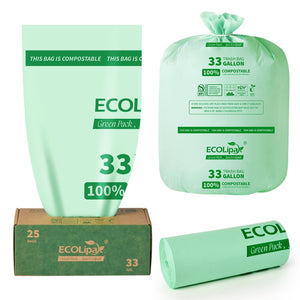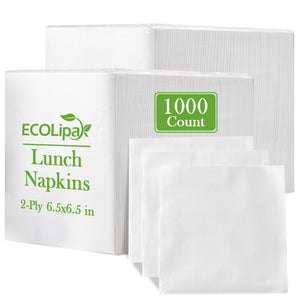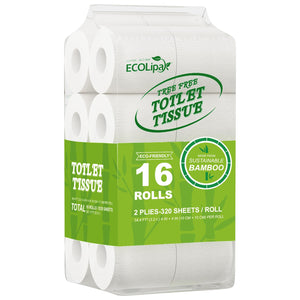Compostic bags, like Ecolipak’s Compostable Trash Bags, decompose because plant-based materials allow microbes to break them down. You see the difference when you choose compostable shopping bags that use PLA and cornstarch, which are engineered to break down in compost. These bags support sustainability and help reduce waste while protecting the environment. They offer sustainable alternatives for families who want eco-friendly options and a sustainable future. Scientific tests show that PLA and cornstarch bags decompose quickly under composting conditions.
|
Test Number |
Temperature |
Condition |
Duration |
|---|---|---|---|
|
1 |
50°C |
Dry heat (static) |
21 days |
|
2 |
60°C |
Dry heat (static) |
21 days |
|
3 |
50°C |
Wet heat (sealed bag) |
21 days |
|
4 |
60°C |
Wet heat (sealed bag) |
21 days |
|
5 |
35°C |
Active composting |
21 days |
|
6 |
50°C |
Active composting |
21 days |
|
7 |
65°C |
Active composting |
21 days |
You help reduce pollution by identifying compostable bags that are explicitly labeled as compostable. Choosing these eco-friendly practices becomes an impactful step toward reducing environmental impact, supporting sustainable practices, and reducing plastic waste. You make a real difference for environmental sustainability and your health by selecting eco-friendly options that are designed for protecting the environment.
Key Takeaways
-
Compostic bags decompose quickly due to plant-based materials like PLA and cornstarch, which are designed for composting.
-
Choosing certified compostable bags helps reduce plastic waste and supports a healthier environment for future generations.
-
Proper composting conditions, including warmth, moisture, and oxygen, are essential for effective decomposition of compostable bags.
-
Ecolipak’s Compostable Trash Bags are durable, tear-resistant, and safe for food waste, making them a practical choice for eco-conscious consumers.
-
Always check for compostability certifications to ensure your bags meet strict environmental standards and break down safely.
Ecolipak and Compostic Bags Overview
What Are Compostic Bags?
You may wonder what makes compostic bags different from regular plastic bags. Compositic bags use plant-based materials like PLA and cornstarch. These materials break down naturally when exposed to microbes in composting environments. You help the planet when you choose compostic bags because they do not leave harmful residues. Instead, they turn into water, carbon dioxide, and organic matter. Many families and businesses now prefer compostable shopping bags because they support a cleaner environment and healthier communities.
Tip: Look for bags labeled as "compostable" with certifications such as BPI ASTM D6400 or OK Compost Home. These labels show that the bags meet strict standards for compostability.
The market for compostic bags continues to grow. More people want eco-friendly products. Cities and towns expand composting programs. You see a shift from conventional plastic bags to compostable alternatives in stores and homes. This change helps reduce plastic pollution and supports green living.
Ecolipak’s Compostable Trash Bags
Ecolipak leads the way in sustainable packaging. The brand’s mission focuses on reducing environmental impact and making green choices easy for you. Ecolipak’s Compostable Trash Bags fit perfectly into the compostic bags category. These bags use corn-based PLA material and carry certifications for home composting. You can trust their compostability and environmental safety.
-
Ecolipak’s bags have BPI ASTM D6400 and OK Compost Home certifications.
-
They are designed for large-capacity needs and work well for outdoor and commercial use.
-
Compared to other brands, Ecolipak offers specific certifications that confirm their compostability.
-
The bags are durable and tear-resistant, making them practical for everyday use.
You support a cleaner planet when you choose Ecolipak’s Compostable Trash Bags. The brand has already helped protect thousands of square meters of green space. As more people become aware of environmental issues, the demand for compostic bags grows. You join a movement that values sustainability and health for your family and community.
Science Behind Compostable Bags
Plant-Based Materials
You may wonder what makes compostic bags break down so easily. The answer lies in the science behind compostable bags. These bags use plant-based materials, such as PLA and cornstarch, instead of petroleum-based plastics. PLA comes from cornstarch and acts as a biodegradable polymer. Cornstarch itself is a natural carbohydrate. Both materials help the bags decompose quickly and safely.
-
Cornstarch-based materials degrade much faster than regular plastics. You help the environment by choosing these bags.
-
PLA can break down into water, carbon dioxide, and organic matter when placed in compost. This process returns nutrients to the soil.
-
Cornstarch and PLA need high temperatures and controlled humidity to decompose effectively. You get the best results when you use these bags in a proper composting environment.
-
PLA is carbon neutral. When it breaks down, it cancels out the carbon emissions released during the process.
Ecolipak uses certified compostable materials in its trash bags. You can trust that these bags meet strict standards for safety and environmental protection. The science behind compostable bags shows how plant-based materials support a cleaner planet and healthier families.
Note: Compostable trash bags from Ecolipak do not leave harmful residues. You protect your home and the environment when you choose certified compostable products.
Microbial Action
Microbes play a key role in breaking down compostable bags. When you place these bags in compost, tiny organisms start to work. They eat away at the plant-based materials and turn them into harmless substances. You help these microbes do their job by providing the right conditions, such as warmth and moisture.
Here is a table showing some of the most effective microbes in the decomposition process:
|
Microbial Species |
Role in Decomposition |
|---|---|
|
Thermobifida |
Effective in PBAT decomposition |
|
Ureibacillus |
Effective in PBAT decomposition |
|
Bacillus |
Effective in PBAT decomposition |
You may not see these microbes, but they work hard behind the scenes. They break down the materials in compostic bags and help return nutrients to the earth. The science behind compostable bags proves that microbes are essential for the process.
Ecolipak’s compostable trash bags hold important certifications. These certifications show that the bags meet strict requirements for compostability and safety. Here is a table that explains some of these requirements:
|
Requirement Type |
Description |
|---|---|
|
ASTM Standards |
Products must meet ASTM standards for composability. |
|
Eligibility Requirements |
Only items associated with desirable feedstocks like food scraps and yard trimming are eligible. |
|
Fluorinated Chemicals (PFAS) |
No intentionally added fluorinated chemicals; must show less than 100 ppm total organic fluorine. |
|
Labeling Requirements |
BPI reviews all product and packaging artwork to ensure proper labeling with the BPI Certification Mark. |
You can feel confident when you use Ecolipak’s compostable trash bags. These bags meet high standards and help you protect your family’s health and the environment. You support a greener future by choosing products that work with nature.
Decomposition Process
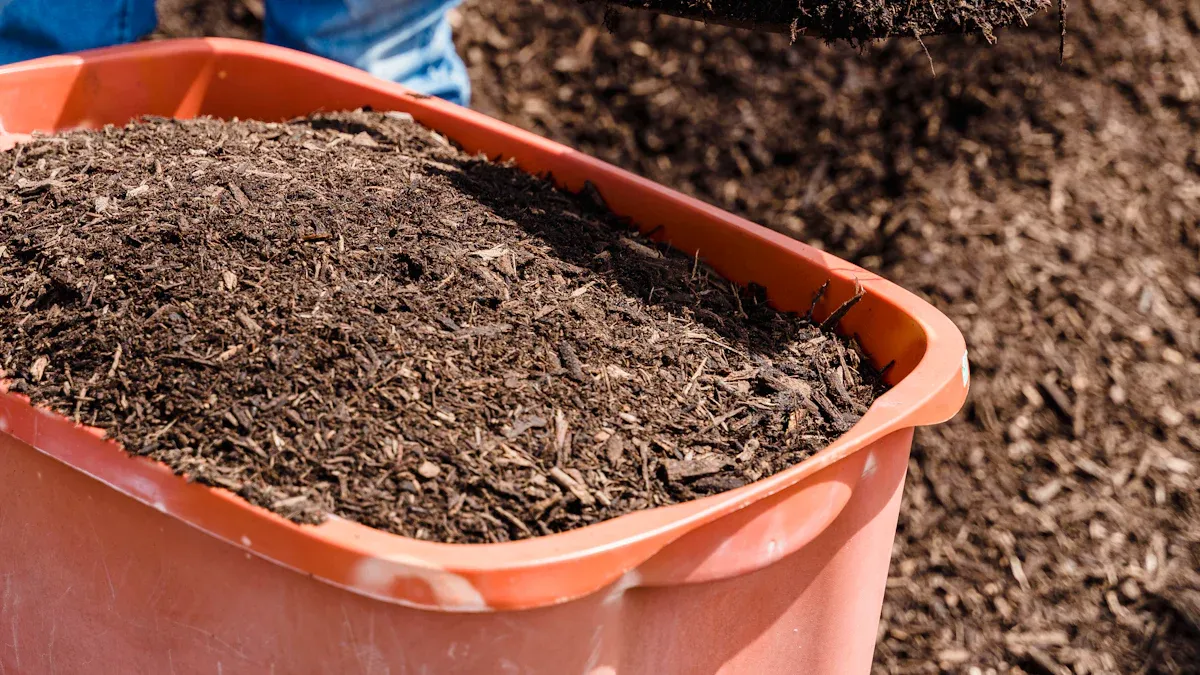
Environmental Conditions
You play a big role in how compostic bags break down. The environment around the bags decides how fast and how well the decomposition process works. Composting needs the right mix of air, water, and warmth. When you place compostable trash bags in a compost pile, you help create the best conditions for microbes to do their job.
Here is a table showing the most important factors that affect the decomposition process:
|
Factor |
Description |
|---|---|
|
Oxygen Availability |
Compostable materials need oxygen to support aerobic microorganisms that facilitate decomposition. Landfills are typically low in oxygen, slowing this process. |
|
Moisture Levels |
Decomposition requires a specific level of moisture to support microbial activity. Many landfills lack consistent moisture, further hindering decomposition. |
|
Temperature |
Industrial composting environments maintain high temperatures to speed up breakdown, whereas landfills are usually cooler, adding another barrier to rapid decomposition. |
|
Waste Compaction |
Landfills are highly compacted to maximize space. This reduces airflow and physical exposure of compostable bags, making it difficult for natural processes to act on the material. |
You see the best results when you use compostic bags in a warm, moist, and well-aerated compost pile. Microbes need oxygen and water to thrive. High temperatures help speed up the decomposition process. If you put compostable bags in a landfill, the lack of air and moisture slows everything down. The bags may take years to break down in those conditions.
Tip: Always place compostable trash bags in a proper composting environment. You help the earth and your community by supporting healthy decomposition.
You also need to think about the materials in the bag. Bags made from cornstarch or PLA break down faster than those with synthetic parts. Microbes like bacteria and fungi work best when the environment supports their growth. You create a healthy space for these tiny helpers when you manage your compost pile well.
Decomposition Steps
You might wonder what happens to compostic bags after you toss them in the compost. The decomposition process follows clear steps. Each stage helps the bag break down and return to nature.
Here is a table showing the main stages of decomposition for PLA and cornstarch-based compostable bags:
|
Stage |
Description |
|---|---|
|
Hydrolysis Stage |
Initiation of hydrolysis reaction in contact with water, breaking down starch into smaller molecules. |
|
Microbial Degradation |
Microorganisms metabolize the degraded starch into water, carbon dioxide, and organic matter. |
|
Complete Decomposition |
Final stage where cornstarch packaging decomposes completely, leaving no harmful residues. |
You start with the hydrolysis stage. Water breaks down the starch in the bag into smaller pieces. Microbes then move in and eat these pieces. They turn the material into water, carbon dioxide, and organic matter. The final stage leaves nothing harmful behind. The bag becomes part of the soil, helping plants grow.
-
Plant-based bags like PLA usually decompose in three to six months if you keep the compost pile warm and moist.
-
Starch blends may take six to twelve months, depending on the environment.
-
Microbes work faster when you give them the right conditions.
You need to remember that compostable bags do not break down well in landfills. Landfills lack oxygen and moisture. Bags may release methane, a greenhouse gas, if they decompose without enough air. You help the environment by using composting facilities or home compost piles.
Note: Compostable bags can contaminate recycling streams if you put them in the wrong bin. Always check local guidelines before disposal.
You protect your family’s health and the planet when you follow the right steps. Composting compostic bags supports a cleaner environment and reduces waste. You make a positive impact every time you choose compostable products and dispose of them properly.
Certifications and Standards
Compostability Certifications
You want to make sure your compostable trash bags meet strict standards before you use them for composting. Certifications help you trust that the bags will break down safely and support environmental sustainability. Several organizations around the world test and certify biodegradable plastic products. These certifications show that the bags meet important requirements for biodegradability and composting.
-
Biodegradable Products Institute (BPI, USA)
-
Australasian Bioplastics Association (ABA, Australia)
-
American Society for Testing and Materials (ASTM, USA)
-
International Organization for Standardization (ISO, global)
-
European Bioplastics (eV, Berlin)
The European Standard EN 13432 sets clear rules for compostable packaging. You see that products must disintegrate within 12 weeks and fully biodegrade within six months. EN 13432 ensures that compostable bags break down quickly and do not add pollution to the soil. When you choose certified bags, you support environmental benefits and help keep your home and community safe.
Tip: Always look for certification logos on your compostable trash bags. These marks show that the product passed tough tests for composting and environmental safety.
Industry Standards
You notice that industry standards for biodegradable plastic bags differ by region. In Europe, the EU's Single-Use Plastics Directive encourages you to use biodegradable alternatives. In North America, states like California and New York push for compostable options by limiting single-use plastic bags. These rules help you make sustainable choices and support environmental benefits.
The table below shows some barriers you may face when choosing compostable bags:
|
Evidence Description |
Details |
|---|---|
|
Regulatory Inconsistency |
Some states, like California, create their own definitions for compostable packaging. |
|
Stringent Labeling Requirements |
California law requires compostable packaging to meet strict food safety and toxicity rules. |
|
Contamination Concerns |
Many composting facilities see plastic materials as contaminants, making composting harder. |
You help reduce pollution and support environmental sustainability when you follow local standards and choose certified products. These standards protect your health and the planet. You make a difference by understanding the rules and picking bags that offer real environmental benefits.
Compostable Shopping Bags vs. Traditional Plastics
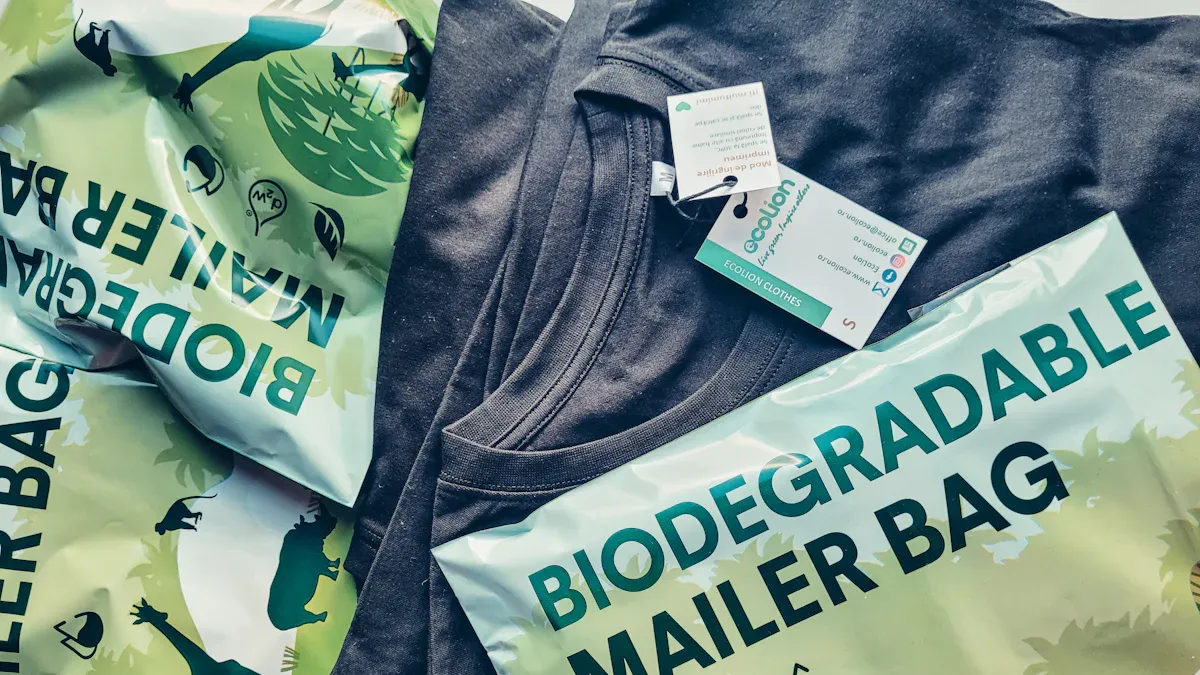
Material Differences
You notice a big difference when you compare compostable shopping bags to traditional plastics. Compostable shopping bags use plant-based materials like corn starch and PLA. These materials come from renewable resources. Traditional plastic bags use petroleum-based materials. They rely on fossil fuels and do not break down easily.
Compostable shopping bags feel sturdy and reliable. You can use them for groceries, kitchen waste, or everyday trash. They hold up well and do not tear easily. When you finish using them, you can place them in a compost bin. Microbes break them down into water, carbon dioxide, and organic matter. Traditional plastics stay in the environment for hundreds of years. They do not decompose quickly and can harm wildlife.
Tip: Choose compostable shopping bags for a sustainable lifestyle. You help reduce plastic waste and support a cleaner environment.
Environmental Impact
You make a positive choice for the environment when you use compostable shopping bags. These bags have a lower environmental impact than traditional plastics, especially when you compost them properly. You support sustainability by choosing bags made from renewable resources. Production of compostable shopping bags creates fewer carbon emissions than petroleum-based plastics.
Here are some important points about environmental impact:
-
Compostable shopping bags reduce landfill waste and greenhouse gas emissions.
-
Composting returns nutrients to the soil and lowers methane emissions.
-
If you throw compostable bags in landfills, their benefits decrease.
-
Growing materials for compostable bags can cause problems if not managed sustainably.
You see the savings when you use Ecolipak’s Compostable Trash Bags. The table below shows how these bags help the environment:
|
Aspect |
Description |
|---|---|
|
Composition |
Made from plant-based materials like corn starch and PLA. |
|
Decomposition Process |
Decomposes faster than regular plastic bags, turning into CO2, water, and biomass. |
|
Environmental Impact |
Reduces landfill waste and greenhouse gas emissions, particularly methane. |
You help protect the planet and your family’s health when you choose compostable shopping bags. You support a sustainable future and make a real difference in your community.
Ecolipak Product Features
Durability and Odor Control
You want a trash bag that does not tear easily. Ecolipak’s Compostable Trash Bags give you strong, tear-resistant performance. You can fill them with kitchen waste, food scraps, or heavier items. The bags hold up well, so you do not worry about leaks or messes. You get peace of mind knowing your trash stays contained.
Odor control matters in your home. Ecolipak’s bags use plant-based materials that help neutralize smells. You notice a fresh, clean scent instead of unpleasant odors. The bags work well in kitchens, bathrooms, and offices. You keep your space healthy and comfortable for your family.
Temperature resistance adds another benefit. Ecolipak’s bags handle temperatures from 122°F to 140°F. You use them for hot or cold waste without losing strength. The bags stay reliable in different conditions, making them a smart choice for busy households.
Tip: Choose Ecolipak’s Compostable Trash Bags for a cleaner, fresher home. You protect your family’s health and help the planet.
Home and Commercial Use
You find Ecolipak’s Compostable Trash Bags fit many needs. You use them at home for daily waste, kitchen scraps, or yard trimmings. The bags fit standard kitchen bins, including SimpleHuman models. You enjoy easy dispensing and quick cleanup.
Businesses also benefit from Ecolipak’s bags. Restaurants, offices, and event planners use them for sustainable waste management. The bags support green initiatives and show customers you care about the environment.
Many customers share positive experiences. They praise the bags for strength, odor control, and eco-friendly design. You join a community that values health and sustainability.
You may face some challenges when switching to compostable bags:
-
Confusion about proper use and disposal.
-
Limited composting facilities in some areas.
You overcome these challenges by learning how to use compostable bags and supporting local composting programs. You make a difference every time you choose Ecolipak. Your actions help protect the earth and create a healthier future for your family.
Myths and Misconceptions
Compostable vs. Biodegradable
You may hear people use "compostable" and "biodegradable" as if they mean the same thing. These words describe different processes. Compostable bags break down into compost under controlled conditions, usually in industrial composting facilities. Biodegradable bags can decompose in soil or water, but they do not always meet strict composting standards.
-
Compostable bags always turn into compost, leaving no visible trace.
-
Biodegradable bags may leave small pieces behind if conditions are not right.
-
All compostable plastics are biodegradable, but not all biodegradable plastics are compostable.
-
Compostable bags need specific temperatures and moisture to break down quickly.
-
Biodegradable plastics can release carbon dioxide, methane, water, and biomass, but the process may take longer.
You help the environment when you choose compostable bags and dispose of them properly. Compostable bags offer more safety for soil and plants when you use them in the right way.
Tip: Always check labels for compostable certifications. This helps you make sure your bags will break down safely.
Common Myths About Compostable Bags
Many myths surround compostable bags. You may hear some of these:
-
Moisture breaks down compostable packaging. In reality, compostable packaging resists moisture and only breaks down in composting conditions.
-
Compostable packaging is only made from paper or cardboard. You find compostable bags made from sugarcane and special polymers.
-
Only bio-based polymers are compostable. Some fossil-based polymers can also be composted.
-
You can throw compostable packaging anywhere, even in oceans. Compostable bags need proper composting facilities.
-
Most compostable packaging ends up in the trash. More composting facilities now accept these bags, so proper disposal is growing.
Microplastics and Safety
You may worry about microplastics when using compostable bags. Research shows that compostable bags can form microplastic particles during degradation, especially in soil. Over twelve months, compostable films released more fragments smaller than 0.05 mm. These tiny pieces can affect soil quality and may increase the risk of crop contamination.
|
Findings |
Implications |
|---|---|
|
Compostable bags can form microplastics during breakdown. |
More research is needed to measure very small particles and their impact. |
|
Compostable bags did not harm composting or final compost quality. |
Compostable bags may be safe for composting if they fully degrade. |
|
Microplastic particles persisted in soil and affected certain fungi. |
Careful management is needed to protect soil and crops. |
You want to know if compostable bags are safe for food waste. Studies show that compostable bags are non-toxic and safe for short-term food storage. They do not harm plant growth after breaking down. Some compostable bags contain more chemical additives than regular plastic bags, but no adverse effects were found on microalgae or fish larvae. You protect your family and the environment when you use certified compostable bags and follow proper disposal guidelines.
Note: Compostable bags offer a safer choice for your home and garden when you use them as directed. You support a cleaner planet and healthier soil for future generations.
You help the planet when you choose Ecolipak’s Compostable Trash Bags. Plant-based materials and active microbes work together to decompose these bags quickly, reducing environmental impact.
In the underwater environment, the compostable bag disappeared completely within three months while the rest of the test subjects remained intact for the duration of the study.
Proper composting and certified products ensure safe results.
|
Step |
Key Actions |
|---|---|
|
A. Check Local Composting Guidelines |
Research local rules and confirm if compostable bags are accepted. |
|
B. Identify Suitable Composting Facilities |
Find home or industrial compost sites for your compostable bags. |
You can inspire others by adopting eco-friendly habits and exploring Ecolipak’s full range of sustainable products.
FAQ
How long do Ecolipak Compostable Trash Bags take to decompose?
You see these bags break down in three to six months under composting conditions. Warmth, moisture, and active microbes help speed up the process.
Can I use Ecolipak Compostable Trash Bags for food waste?
You can use these bags for food scraps. The plant-based materials are safe for kitchen waste and help keep your home clean and healthy.
Are Ecolipak Compostable Trash Bags strong enough for heavy loads?
You get tear-resistant bags that handle heavy kitchen waste. The durable design keeps your trash contained and prevents leaks.
Where should I dispose of compostable trash bags?
You should place these bags in a compost bin or facility. Composting helps the bags break down quickly and supports a cleaner environment.
Do Ecolipak Compostable Trash Bags control odors?
You notice a fresh scent with these bags. The natural materials help neutralize unpleasant smells, making your kitchen more comfortable.




